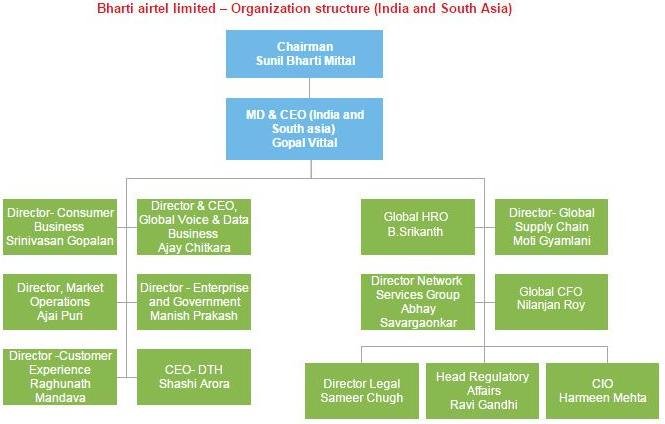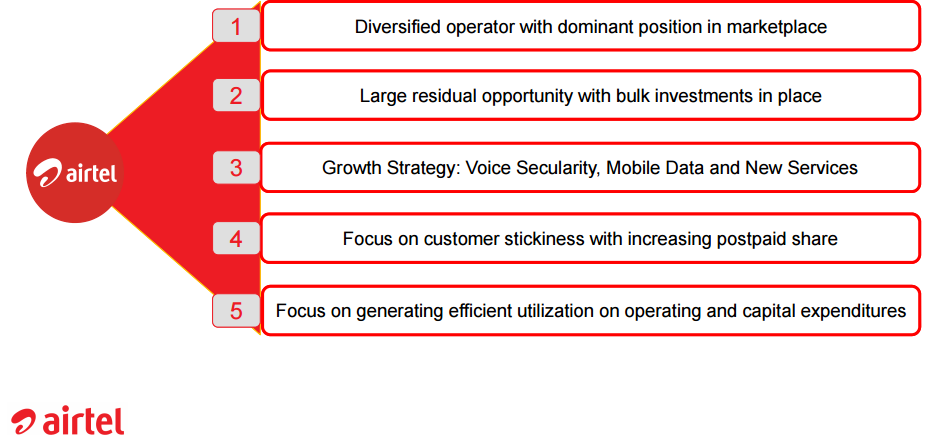
Telecom network operator Bharti Airtel has 325 million wireless subscribers globally. It achieved more than 1.23 trillion minutes of calls in fiscal 2015 and over 333 petabytes of data over the last year – riding on over 175,000 base station sites.
Bharti Airtel started the journey in Indian telecom market in 1998 when it announced the launch of GSM wireless services in Delhi and Himachal Pradesh under the then CEO Sunil Mittal. Bharti Airtel has $15 billion revenue. The revenue growth of Airtel’s telecom business in India will face challenges due to the entry of Reliance Jio Infocom, a telecom venture promoted by Mukesh Ambani.
Despite challenges, Sunil Mittal, the chairman of Bharti Airtel, does not need his family members to run the telecom giant since he relies on CEOs Gopal Vittal for India business and Christian De Faria, who runs Africa business.

Composition of Airtel revenue
Bharti Airtel generates 53 percent revenue from India wireless, 25 percent from Africa, 2 percent from South Asia (Bangladesh and Sri Lanka), 7 percent from Airtel Business, 5 percent from Tower Infrastructure, 5 percent from Telemedia (broadband) and 3 percent from digital TV. The revenue mix indicates that stable presence in India and Africa is important for Airtel for its future growth.
63 percent EBITDA came from Airtel’s India and SA Wireless business in Q2 fiscal 2016, 15 percent from Africa Wireless, 8 percent from Tower Infrastructure, 5 percent from Airtel business, 6 percent from Telemedia and 3 percent from Digital TV.
Airtel says EBITDA margin of India Wireless is 38.7 percent, Africa Wireless has 20.3 percent, Tower Infrastructure 45.2 percent, Airtel business 23.3 percent, Telemedia 45.2 percent and Digital TV 34.1 percent.
Why Africa and India
Bharti Airtel is betting on both India and Africa because these two telecom markets are adding more mobile subscribers in the world. Airtel has 235.2 million customers in India, 80.8 million in Africa and 9.8 million in South Asia.
India added 12 million new subscribers in June 2015 quarter, Africa 20 million, Central and Eastern Europe 5 million, Western Europe 0.25 million, North America 5 million, Latin America 1 million and Asia Pacific (excluding China and India) 10 million, according to Ericsson Mobility report.
In India, telecom consolidation has assisted top three telecom network operators to gain revenue market. Revenue share of the top three increased to 71 percent in 2014 from 66 percent in 2011 and 57 percent in 2008.
In Africa, Airtel has made investment to increase cell sites to 19,300 in 2015 from 10,000 in 2010 when it expanded subscriber base to 81 million from 35 million.
Airtel dominates India revenue share
The telecom operator, which is 30 percent owned by SingTel, is controlling 31.1 percent of Indian wireless revenue share and 24 percent of wireless subscriber base.
Bharti Airtel has wireless revenue share of 31.1 percent as compared with Vodafone 23.3 percent, Idea Cellular 18.7 percent, Reliance Communications 5.6 percent, BSNL and MTNL 4.9 percent, Tata Docomo 6.8 percent, Aircel 5.6 percent and others 3.6 percent, according to TRAI.
The share of Bharti Airtel based wireless subscriber base is 24 percent, Vodafone 19 percent, Idea Cellular 16 percent, Reliance Communications 11 percent, Aircel 8 percent, BSNL and MTNL 8 percent, Tata Docomo 6 percent and others 7 percent.
A comparison between revenue share and subscriber share of Airtel rivals indicate that several telecoms are adding less ARPU customers.

Airtel and spectrum
Airtel has 116.4 MHz spectrum in 900 MHz band, 177.1 MHz in 1800 MHz, 100 MHz in 2100 MHz and 80 MHz in 2300 MHz, making the company one of the top players in spectrum as well. Bharti Airtel plans to leverage its existing network and spectrum position for data roll-outs.
There are indications that Reliance Jio Infocomm will shake up the Indian telecom market. A superior and cost effective service can assist Mukesh Ambani to take on Sunil Mittal. If Reliance Jio’s $15 billion investment in the 4G venture is focused on quality and coverage, Bharti Airtel’s $3 billion plus annual Capex will not be enough to meet demands of its subscribers.
Baburajan K
editor@telecomlead.com
